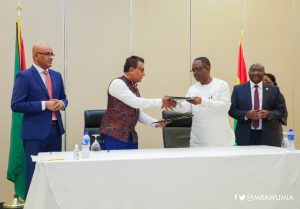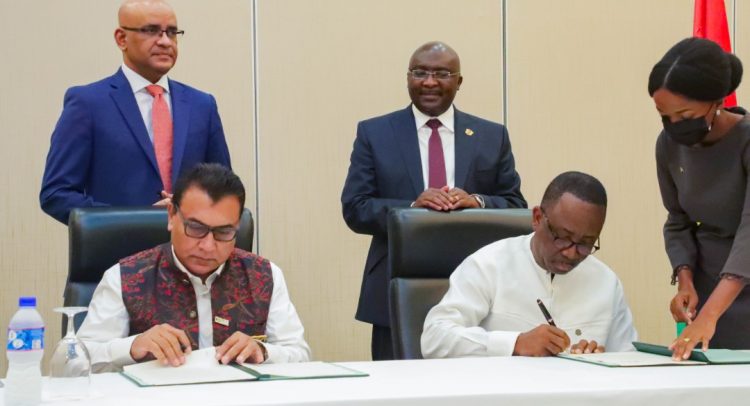The Governments of Ghana and Guyana have signed a Framework Agreement on Co-operation designed to actualize the growing strategic partnership between the two countries.
Several Memoranda of Understanding (MoU) in the Petroleum and Investment promotion sectors have also been signed on Tuesday, December 7, 2021, in Georgetown, Guyana, at the end of a three-day official visit by the Vice President of Ghana, Dr. Mahamudu Bawumia.
The signing of the Framework Agreement, witnessed by the Vice Presidents of Ghana and Guyana, is the culmination of several months of high-level engagements between the two countries, including a three-day official visit to Ghana by the Vice President of Guyana, H.E. Dr. Bharrat Jagdeo, followed a few weeks after, by a three-day visit by Ghana’s Vice President Dr. Mahamudu Bawumia.

Ghana’s Deputy Minister of Foreign Affairs and Regional Integration, Hon Thomas Mbomba, signed the Framework Agreement on behalf of the Government for Ghana, while Hon Hugh Hilton Todd, Minister of Foreign Affairs and International Cooperation, signed on behalf of the Co-operative Republic of Guyana.
Hon Mbomba also signed, on behalf of the Petroleum Commission of Ghana, a Memorandum of Understanding on cooperation in the petroleum sector with the Ministry of Natural Resources of Guyana represented by Hon Vickram Bharrat, Minister of Natural Resources, Minister Responsible for Petroleum, while Mr. Alex Dadey, Board Chairman of the Ghana Investment Promotion Centre (GIPC), signed an MoU on Mutual Cooperation In Investment Promotion with the Guyana Office for Investment, represented by Peter R. Ramsaroop, Chief Investment Officer, and CEO, Guyana Office for Foreign and Local Investments.
Among others, the parties to the Framework Agreement seek to promote Co-operation with the objectives of contributing to the development of their resources, by making efforts to ensure that the programs and projects resulting from the Agreement are by the policy and development plan in the respective countries, as additional support to their internal efforts to attain the objectives of social and economic development.
The Co-operation includes the exchange of information; professional training through programs of visits, or specialized courses by the granting of scholarships for technical and professional specialization; implementation of joint projects of technical co-operation in areas of mutual interest; exchange of professionals and technicians; supply of equipment and material needed for the implementation of specific projects; and any other form of co-operation to be agreed upon by the two countries.
The Agreement is valid for five years and shall be renewed automatically for successive periods of equal duration unless the Parties mutually agree otherwise or either of them terminates it by the provisions of the Agreement.
Under the Petroleum pact, Ghana’s Petroleum Commission and the Ministry of Natural Resources of Guyana agreed to work with each other to achieve areas of collaboration in furtherance of the Framework Agreement. The scope of collaboration, they agreed, maybe in the areas of Legal, Fiscal, and Technical support services, non-Technical support and assistance, and any other petroleum-related areas.
Among others, the Petroleum Commission is to use its expertise and resources to support Guyana to develop its national competencies to enable it to efficiently manage the Petroleum Sector; evaluate and establish future partnership opportunities with the Commission and other relevant entities in Ghana to ensure continued collaboration between the two countries; and provide certain consulting and project management services and other activities.
TIPS
On its part, the GIPC has agreed to work with its Guyanese counterpart to cooperate and create conducive relations aimed at supporting trade and investment promotion activities in each other’s country. The two parties also agreed to set up information-sharing mechanisms to facilitate regular exchange of information on economic and trade developments in their respective countries, including laws and regulations, policy measures, industrial standards, and trends, market analysis reports, exhibitions and forums, trade leads as well as investment projects and opportunities in both countries.
The Centre has also agreed to, among others, organize business, trade, and/or investment delegations to the country of either Party and in the same manner, support, facilitate or assist similar visiting business, trade, and/or investment delegations organized by the other Party and to co-host agreed mutually beneficial events including economic and trade policy dialogues between relevant government agencies and business delegations in Ghana and Guyana.


